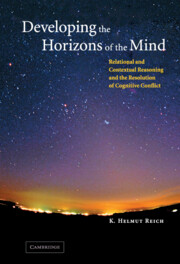 Developing the Horizons of the Mind
Developing the Horizons of the Mind Book contents
- Frontmatter
- Contents
- List of figures
- List of tables
- Acknowledgements
- Introduction
- Part I The Theory of Relational and Contextual Reasoning (RCR) and its Empirical Study
- 1 Introduction
- 2 Development of RCR
- 3 Metaphysical Assumptions and Theory of RCR
- 4 Empirical Studies of RCR
- 5 Other Thought Forms and Matching Them to the Problem at Hand
- Part II Applications of RCR
- Appendix 1 Interviewing techniques
- Appendix 2 Scoring manual for RCR
- References
- Index
4 - Empirical Studies of RCR
Published online by Cambridge University Press: 22 September 2009
- Frontmatter
- Contents
- List of figures
- List of tables
- Acknowledgements
- Introduction
- Part I The Theory of Relational and Contextual Reasoning (RCR) and its Empirical Study
- 1 Introduction
- 2 Development of RCR
- 3 Metaphysical Assumptions and Theory of RCR
- 4 Empirical Studies of RCR
- 5 Other Thought Forms and Matching Them to the Problem at Hand
- Part II Applications of RCR
- Appendix 1 Interviewing techniques
- Appendix 2 Scoring manual for RCR
- References
- Index
Summary
Overview
The empirical research proceeded as follows: first pilot study in 1985 (basic nature of RCR and RCR developmental levels), second pilot study in 1988 (new standard interview problem), third pilot study in 1988/1989 (RCR and Piagetian concrete and formal operations), fourth pilot study in 1992/1993 (RCR, Piagetian formal operations, cognitively complex thought, and use/understanding of more than one logic). Respondents changed from study to study.
All studies are methodologically flawed in several ways, but they do point to the value of considering RCR as a distinct form of reasoning, and demonstrate its developmental levels.
A first flaw is that almost all respondents were non-representative. The children and adolescents were all pupils from ‘higher-level’ primary and secondary schools (that is not from ‘lower-level’ schools, let alone school drop-outs), and the adults mostly had university degrees. The adults had been ‘hand-picked’ throughout. Criteria were a ‘scientific’ thinking style as opposed to a dogmatic or an ad hoc style, and the capacity to express one's thought clearly and fairly rapidly.
The reason for wishing to work with specifically chosen (unrepresentative) respondents is as follows. It was suspected that RCR would evolve with cognitive development. In any such development, the tricky, and particularly interesting developmental levels/stages are the higher ones, because the lower ones ‘aim’ at a developmental ‘end point’, which appears the more clearly, the higher the level/stage. Unfortunately, and understandably, the higher the level, the smaller the number of persons found at that level.
- Type
- Chapter
- Information
- Developing the Horizons of the MindRelational and Contextual Reasoning and the Resolution of Cognitive Conflict, pp. 47 - 74Publisher: Cambridge University PressPrint publication year: 2002


